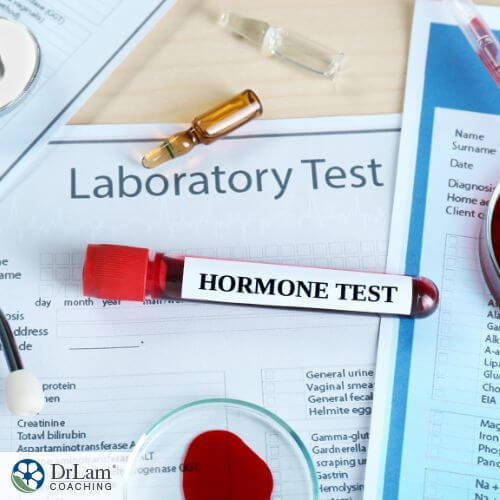 Your hormones are chemical messengers your body produces that regulate different bodily functions. Hormones carry messages through your blood to your body's muscles, organs, skin, and other tissues. They control processes such as metabolism, homeostasis (constant internal balance), sexual function, growth and development, mood, sleep-wake cycle, and reproduction. There are more than fifty different hormones in the human body. Hormone imbalances can occur when you have too much or too little of particular hormones. This can impact your health and well-being. Taking a hormone test is a way to identify the imbalance and determine which steps you can take to get back on track to good health.
Your hormones are chemical messengers your body produces that regulate different bodily functions. Hormones carry messages through your blood to your body's muscles, organs, skin, and other tissues. They control processes such as metabolism, homeostasis (constant internal balance), sexual function, growth and development, mood, sleep-wake cycle, and reproduction. There are more than fifty different hormones in the human body. Hormone imbalances can occur when you have too much or too little of particular hormones. This can impact your health and well-being. Taking a hormone test is a way to identify the imbalance and determine which steps you can take to get back on track to good health.
Hormone tests are used to evaluate for hormonal imbalances and hormone levels. A hormone imbalance may cause a variety of symptoms and make you feel unwell. This evaluation can be done using different methods. The expertise of an endocrinologist, who specializes in remedying hormone disorders is typically best when doing a hormone test. An expert healthcare provider can identify the appropriate test for your specific symptoms.
These kinds of tests play a role in detecting hormone imbalances in patients or determining whether or not ongoing hormone therapy is effective. Hormonal fluctuation is normal as you go through different stages of life. During puberty, pregnancy, or menopause, your normal hormone levels can shift dramatically. Still, other factors can contribute to hormone imbalance, including high levels of stress, steroid use, or particular certain prescription medications. Furthermore, medical conditions, like anxiety and fatigue could also play a role as well.
Hormone tests for women can check for pregnancy, track menopause, and help you to understand the source of reproductive health issues. Additionally, a hormone test may be used for the purpose of identifying, monitoring, and screening health issues. They may be used for issues like menstrual problems, changes in sex characteristics, fatigue, loss of libido, or problems conceiving. They may also be used if a healthcare provider suspects a particular condition like PCOS, thyroid disease, ovarian cysts, or possible cancer, he or she may order testing. Hormone tests can be beneficial in arriving at a cause for conditions like delayed development, infertility, or early menopause, among other conditions.
Your healthcare provider can test your hormone levels using blood, saliva, or urine samples. The type of hormone test that your healthcare provider might recommend may depend on a number of factors. These may include health conditions, the hormone being tested, current hormone therapy, and individual preferences.
Hormone test methods include:
A saliva test more convenient to collect samples of than other hormone tests. The patient typically spits into a series of tubes multiple times during the course of a single day or over several days. Then, these samples are sent to a laboratory to determine individual or average measurements of hormone levels. Sometimes, test samples are collected at home.
In general, a saliva hormone test usually shows only the free hormones actively available to the body rather than the total level of hormones present in your bloodstream. Notably, one limitation of this test is that, in saliva, some hormone concentrations are inherently higher or lower than in blood or urine tests. Furthermore, variables like pH levels in your mouth, teeth brushing effects, and food intake can also factor into the results of saliva testing.
The hormones that are ideal for saliva testing include:
 cortisol
cortisolSaliva tests can often play a key role in assessment. It is a commonly used method of evaluating the progress of hormone replacement therapy (HRT). This is especially the case with topical HRT options.
A blood serum test for hormone levels involves a typical blood draw, which can be done in a lab or doctor’s office. This test can be used to determine the levels of particular hormones present in your bloodstream. The blood serum hormone test analyzes blood, not in its dry form, but in its liquid or original state. While this form of testing is slightly more advantageous for testing a wider range of hormones, it has a shorter shelf life than other forms of test.
The hormones that are ideal for blood serum testing include:
One limitation of the blood serum test is that it’s not the most suitable for measuring hormone levels that are impacted by variables such as creams, HRT gels, or other topical therapies. When it comes to reliability, this test is effective for monitoring hormone levels in patients that use pellet therapy or HRT injections.
A blood spot hormone test is a minimally invasive procedure that involves a finger prick and blood dropped directly onto a filter card in several spots. Then, it’s allowed to dry in place on the card. The dry blood becomes stable for delivery to a lab, where the blood spot is rehydrated. Additionally, this test can be carried out at home.
On one hand, blood spot samples are beneficial for longer-term stability compared to blood serum samples. On the other hand, blood spot samples are more limited in the range of hormones they can test for. Still, they give accurate results for several critical hormones. Furthermore, compared to blood serum testing, this test is even more effective for monitoring hormone levels in patients that use topical HRT creams or gels.
The hormones that are ideal for blood spot testing and assessment include:
In a urine hormone test, usually, multiple samples of urine are collected several times during the day. This can be done privately at home, where, for 24 hours, urine is collected in a designated container. A clearer picture of hormone fluctuations can be determined from multiple samples collected in a day. With a larger sample volume and variety, urine concentration and other variables can be observed.
Free hormones are ideal for urine testing and assessment and include:
One notable advantage of urine testing is that it allows your healthcare provider a specific means of assessing how hormones are metabolized in the body. Specifically, one study in the Journal of Clinical & Translational Endocrinology found that a dried urine test is a novel sampling method for the assessment of cortisol and cortisol metabolites.
Urine tests provide the chance to identify disease risks, like cancer risk. Typically, a urine sample can indicate a lack of proper hormone breakdown in your body. Urine testing is beneficial in patients using injectable, oral, topical, or pellet HRT therapies.
 A hormone imbalance can be evaluated by means of stimulation and suppression tests. You may be given hormones and other substances that may either begin (stimulate) or stop (suppress) the production of particular hormones. Then, healthcare professionals evaluate how your body responds to either method applied.
A hormone imbalance can be evaluated by means of stimulation and suppression tests. You may be given hormones and other substances that may either begin (stimulate) or stop (suppress) the production of particular hormones. Then, healthcare professionals evaluate how your body responds to either method applied.
Typical types of stimulation and suppression hormone testing include:
The hormone glucagon is injected into your muscle tissue and growth hormone levels are measured over a four-hour period. This hormone test is useful in confirming or ruling out a deficiency in adult growth hormone.
In this test, you are given cosyntropin, which mimics ACTH or adrenocorticotropic hormone. Produced by the pituitary gland, ACTH plays the critical role of stimulating the adrenal glands to produce cortisol. Cortisol levels are measured at 30-minute intervals during a one-hour period. Adrenal insufficiency is confirmed after the evaluation.
You are given a sweet drink that’s intended to decrease levels of growth hormone. Then, the levels of growth hormone in your blood are measured at a two-hour interval. Acromegaly is confirmed with this test if growth hormone is elevated. If sugars are elevated, then diabetes can be confirmed with this test.
In this test, you are given a dexamethasone tablet to take during the night. It’s meant to block cortisol production. The following day, a blood sample is taken from you and your cortisol levels are measured. Cushing's syndrome is confirmed or ruled out.
In this test, you are given a metyrapone tablet to take at night that’s intended to block cortisol production. The next day a blood sample is taken from you and cortisol and ACTH levels are measured. Adrenal insufficiency is confirmed or ruled out.
Generally speaking, no singular type of hormone test is preferred by a healthcare provider. Instead, factors such as a patient’s individual needs typically determine the type of hormone test that’s best.
Some factors that a healthcare provider may consider include patients’:
Based on a 2022 work by Deb Matthew, MD, the best test for you may depend on your life stages and if you are on hormone replacement therapy or not. In summary, if you are:
In general, which test is best for you is best determined by your doctor.
 Hormonal imbalances occur when your body is making either too much or too little of a specific hormone. This can also happen when your body is unable to adequately respond to the hormones that are present. Hormonal imbalances can be responsible for a variety of undesirable symptoms.
Hormonal imbalances occur when your body is making either too much or too little of a specific hormone. This can also happen when your body is unable to adequately respond to the hormones that are present. Hormonal imbalances can be responsible for a variety of undesirable symptoms.
Five common hormone imbalances include:
There are two main kinds of diabetes: type 1 and type 2 diabetes. Both types lead to too much glucose in your blood. With Type 1 diabetes, your body cannot make the hormone called insulin. When you have Type 2 diabetes, your body no longer makes or uses insulin as it normally should.
Your thyroid gland makes thyroid hormone, which regulates how the body uses energy. This hormone also impacts the function of all your organs. Hypothyroidism happens when your thyroid does not produce enough hormones. Hyperthyroidism, on the other hand, occurs when your thyroid produces too many hormones.
According to a review in Endotext, Adrenal insufficiency is an uncommon clinical condition resulting from inadequate glucocorticoid secretion or action, either at the base state or during stress. In simple terms, adrenal insufficiency happens when your adrenal gland stops making enough of particular hormones like aldosterone and the stress hormone cortisol.
Adrenal Fatigue Syndrome (AFS) is a different condition but very common. It also results from subclinically low adrenal hormones due to chronic stress, but it is not Addison's disease. Chronic stress causes the adrenals and the NeuroEndoMetabolic (NEM) stress response to produce high levels of cortisol to manage the stress, but over time these high levels deplete the resources needed for other key hormones and for cortisol itself, resulting in low levels. The adrenals are part of the Hormone circuit of the NEM along with the thyroid and reproductive glands. This close relationship describes how adrenal issues can lead to other hormone imbalances, common in AFS.
PCOS is characterized by problems with the hormones insulin, testosterone, and other androgens in women of reproductive age. Women experience decreased ovulation and excessive facial hair growth with this condition.
This hormonal condition in males can result from low levels of the hormone testosterone. This hormone is crucial in males because it influences the development of sex characteristics, such as body and facial hair. Furthermore, it impacts muscle development, sex drive, and sperm production.
There are a wide range of ways to manage hormone imbalances. In general, any management methods you may need for a hormone imbalance will depend heavily on the type of hormone imbalance you are dealing with. Once testing has clarified what type of imbalance you have, it's best to research methods to manage what you are dealing with individually and talk to your doctor.
You may need to see an endocrinologist who specializes in endocrinology and can assess endocrine (hormone) conditions, establish remedy and management plans, and prescribe medication.
Remedies can range from hormone replacement therapy (HRT), radiation therapy, or surgery to diet and lifestyle changes like managing the level of stress in your life, eating less sugar, and exercising more. Some hormone imbalances are mild or go away on their own, some can be reversed, and some require lifelong medication or more intensive care. It varies widely.
Hormone imbalance is a common occurrence and a hormone test could help to determine the level of hormone present in your bloodstream. If you have a high or low level of a certain hormone, it's important to know so you can take the right steps to manage the imbalance.
If you are experiencing symptoms of hormonal imbalance and would like to learn about ways to identify the problem, the team at Dr. Lam Coaching can help. We offer a free** no-obligation phone consultation at +1 (626) 571-1234 where we will privately discuss your health concerns and various options. You can also send us a question through our Ask The Doctor system by clicking here.
Abrams, E. "Hormonal Imbalance and Hormone Regulated Issues." Journal of Molecular Pathophysiology, vol. 10, no. 8, 2021, pp. 01-02. JMolPat, https://www.jmolpat.com/jmolpat-articles/hormonal-imbalance-and-hormone-regulated-issues.pdf. Accessed 6 Nov. 2023.
Alexandraki, KI, Sanpawithayakul, K., and Grossman, A. "Adrenal Insufficiency." Endotext, edited by KR Feingold et al., MDText.com, Inc., 2022. NCBI Bookshelf, https://www.ncbi.nlm.nih.gov/books/NBK279083/. Accessed 7 Nov. 2022.
"Hormones: What They Are, Function & Types." Cleveland Clinic, https://my.clevelandclinic.org/health/articles/22464-hormones. Accessed 6 Nov. 2023.
Newman, M., Curran, D. A., and Mayfield, B. P. "Dried Urine and Salivary Profiling for Complete Assessment of Cortisol and Cortisol Metabolites." Journal of Clinical & Translational Endocrinology, vol. 22, 2020, Article 100243. ScienceDirect, https://doi.org/10.1016/j.jcte.2020.100243. Accessed 6 Nov. 2023.
The best hormone test for you may depend on your symptoms, your personal preference, or if you are currently on hormone replacement therapy. Many tests don't test all hormones equally well, and some have other advantages like showing your risk for certain cancers as well. In general, the best hormone test for you is something you will need to choose with your doctor's help.
